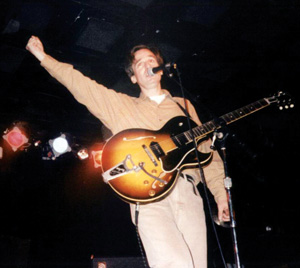

EVEN in death, Alex Chilton can’t catch a break. In the wake of his passing last week—far, far too early at age 59—one of the most gifted songwriters in the history of rock music is being remembered not with one of his own songs, but with an Internet pile-up of people quoting the Replacements’ tribute song, “Alex Chilton.”
Don’t get me wrong, “Alex Chilton” is one of my top 20 favorite songs. And we all owe Paul Westerberg a debt of gratitude for writing it; undoubtedly, he turned more people on to Chilton’s band Big Star than anyone else on the planet. And of course the lines everyone is opening their obits with are all too ironic: “Children by the millions, waiting for Alex Chilton, when he comes round.” No, Westerberg’s fantasy never came true, despite his own best efforts. (Chilton, by contrast, was about the worst self-promoter that any rock legend could possibly be.) And yes, it’s tragic that the ‘Mats’ vision of musical genius finally rising from its cult circuit into the stratosphere of worldwide stardom didn’t materialize.
Still, isn’t Chilton best eulogized by his own lyrics? A few lines that demonstrate his vivid imagery and emotive power? Something that shows what he was capable of, rather than what he never achieved?
Because no matter how much official music history might emphasize his career disappointments, part of Chilton’s magic was the way he could snatch victory from the jaws of defeat. Even at age 16, when he was basically a teenage pop star getting famously screwed by the music industry as lead singer for the Box Tops, he managed to turn out some classic performances. “The Letter,” which was a No. 1 hit in 1967, is the best known, but listen to the Box Tops’ string of singles (most not written by Chilton) now, and what endures is the sound of a group of raw and soulful square pegs whose handlers tried unsuccessfully to hammer them into a round hole of whitewashed pop fluff. Their best songs still hold up as great Memphis music.
When Chilton formed Big Star in 1971 with Chris Bell (another poorly understood cult figure who died too young), he made probably the two best albums of power-pop ever recorded, #1 Record and Radio City. Considering that the albums’ best songs weren’t recognized for more or less creating slacker-rock until much later, the title of the former began the group’s long relationship with irony (their b-side anthem “In The Street,” to the shock of Big Star’s small but loyal following, popped into the mainstream out of nowhere as the theme to That 70s Show, 26 years after its release). The albums’ failures were a sucker punch for Chilton, who had no idea songs like “September Gurls” and “Thirteen”—which he wrote when he was actually 13—would one day be considered indie-rock classics, covered by everyone from the gothy sirens of the This Mortal Coil collective to roots-rockers Wilco to ’80s popsters the Bangles.
Chilton’s talent for making great art out of disaster hit its apex with his next Big Star album, Third (also marketed, for some idiotic reason, as Sister Lovers). Begun in 1974 but not released until 1978, it was made by an unhappy Chilton whose band had all but disintegrated, and who seemed to be disintegrating himself. The result, deemed not even releasable by his record company at the time, is like no other album ever recorded. The sadness and alienation of “Nighttime” and “Big Black Car” wind through the sparkle of “Kangaroo” and “Take Care,” while “O Dana” and “You Can’t Have Me” are almost inexplicable in their meandering melodies and mix of abstract and personal lyrics. The monster in the middle is “Holocaust,” a song so quiet and understated in its sheer brutality that it laid the blueprint for a whole subgenre of pretty hate songs. That an album so sonically mixed-up and lyrically moody could be cohesive seems impossible until it’s been given a few listens. What ties the songs together, besides Chilton’s distinctive voice and perspective, is a quality that can only be described as grace.
In the ’80s, Chilton stumbled through a sometimes-interesting solo career while groups like R.E.M. and Yo La Tengo began spreading the legend of Big Star on a larger scale, finally giving him his due. Back then, there was basically no way to discover Chilton’s work except through degrees of separation. I first did when I heard Scott Miller, lead singer of my favorite band in high school, NorCal’s Game Theory, sing “O Dana” on the San Luis Obispo college radio station KCPR. I went back to Game Theory’s 1985 album Real Nighttime and figured out that “You Can’t Have Me” was a cover, which sent me straight to the record store to find out what this Big Star thing was all about.
That wasn’t too long before the Replacements released “Alex Chilton” on their Pleased to Meet Me EP. It is a timeless tribute, but right now I prefer to remember the man with one of his own songs; the upbeat, celebratory “Thank You Friends”: “Thank you, friends/ Wouldn’t be here if it wasn’t for you/ I’m so grateful for all the things you helped me do/ All the ladies and gentlemen/ Who made this all so probable.”


